












We’re delighted to bring you this careers publication, the first of its kind from the Chartered Institute for the Management of Sport and Physical Activity (CIMSPA) and the first definitive set of careers advice and guidance for the sector. We very much view this as the first of many future publications.
You’ll see from industry statistics, the sport and physical activity sector is growing rapidly with exciting new opportunities, new settings for physical activity, new audiences to work with and new technology providing new innovative approaches to the way people take part in sport and physical activity.
CIMSPA supports over 585000 people currently working in sport and physical activity. We want to attract new talent to fill the pipeline as our sector grows and others leave. There are so many opportunities! We are incredibly proud of our talented professionals who provide high quality services to everyone that wants to take part.
In the future we want to grow the opportunities for people to work in the sector, raise the standards of professionalism, improve working conditions and ensure our sector is where everyone wants to be and has the opportunity to be part of.
This careers guide is an important part of our work. It is designed to help people realise their potential by showing clear routes into and through the sector. We hope you find the information contained practical and useful.
There is so much happening within sport and physical activity. The best way to stay on top of it and take advantage of the many opportunities presented is to be a member or partner of your professional body.
Find out more about CIMSPA and what it does at www.cimspa.co.uk.
Get in touch - there are exciting opportunities now and more to come!
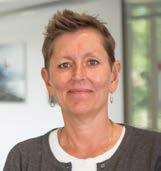
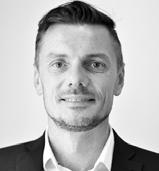
Colin Huffen MCIMSPAHead of Workforce Policy and External Affairs.
CIMSPA.Tara Dillon FCIMSPA (ch) Chief Executive Officer. CIMSPA
Publisher Careermap Ltd
www.cimspa.co.uk twitter.com/cimspa facebook.com/CIMSPA instagram.com/cimspa linkedin.com/groups/1790278
Careermap creates bespoke publications about careers and qualifications. Careers are not a linear path and you cannot know what you don’t know. We aim to inspire and inform about all sorts of careers and opportunities, now and in the future. We look at all the pathways you can take, be that vocational, academic and/or professional.
To find out more, contact the Editor at info@careermag.co.uk
CIMSPA is the professional development body for the UK’s sport and physical activity sector.
Our purpose is to shape a respected, regulated, and recognised sector that everyone wants to be a part of, and that others are confident interacting with. We work with stakeholders across and beyond the sector to achieve this.
Supporting people to choose the right career path is important to us and we hope you find this guide useful in understanding the many opportunities to work in the Sport and Physical Activity Sector.

We are the sector’s chartered professional development body. We are committed to supporting, developing and
enabling professionals
sport
our
and organisations to succeed in the
and physical activity sector and, as a result, inspire
nation
to
become more active.
CIMSPA helps to nurture talent, develop careers, inspire professionalism and set clear regulatory standards for success, continuing the development of a modern, prosperous and respected sport and physical activity sector.
Together we’re developing a vibrant, UK-wide sport and physical activity sector, with the highest standards of service delivery.
Shaping a recognised, respected and inclusive sport and physical activity sector that everyone wants to be part of.
What does CIMSPA’s work involve?
CIMSPA interacts with the sport and physical activity sector’s workforce and key stakeholders to identify the best practices and standards that should be adopted by our sector. We then identify the best and most suitable methods to encourage the sector’s uptake of them. We achieve this by interacting with employers, deployers, active partnerships, NGBs, awarding organisations, higher educational institutes, training providers, practitioners, professionals, and policy shapers.
By engaging with these stakeholders, CIMSPA identifies the requirements and expectations of the sector’s workforce and employers, identifies areas for development and barriers affecting its ability to deliver. As a result of our work, CIMSPA helps and contributes to the production of tools and resources to professionalise, develop and safeguard the sector’s workforce, organisations and reputation. There is a continuous process of engaging with stakeholders to listen, learn, propose and review best practices.
mission
Through our work we will:
• Allow individuals to realise their potential by having a clear route into and through our sector.
• Provide employers with the best people.
• Ensure the availability of quality and relevant learning and development opportunities.
• Be the lead organisation on sport and physical activity workforce policy.
• Give the public increased confidence in a professional, respectable sector.
CIMSPA’s sole purpose is to meet the needs and requirements of the sport and physical activity sector. In 2013, CIMSPA led a sector-wide consultation and business review to ensure our chartered statutes and organisational activities is fit for the sector. As a result of our findings, we updated our offering to better accommodate the needs help the sector prosper. In the years following, we have been striving to unite the sector and align everyone’s efforts to shape a respected, regulated and recognised sector
The progress already made by CIMSPA and our sector is outstanding, and the future is brimming with new opportunities.
The sport and physical activity sector is large and varied with tens of thousands of jobs available and hundreds of employers. To make sense of the sector for everyone, CIMSPA has created clear definitions to help.
The sector has industries and occupations.
Industries
Are the place services are delivered
There are four core industries in the Sport and Physical Activity sector.
Exercise and Fitness - Services, activities and venues that predominantly improve participant physical fitness.
Leisure Operations - Services, activities and venues that predominantly improve participation in physical activity.
Community Sport - Sport/skill based services, activities and venues that increase participation and develop skill, sometimes targeting under represented groups and inequalities.
Performance Sport. - Competitive sport and activities including those in which athletes receive payment for their performance; professional, semi-professional and grass roots sport.
Every industry has people who work in leadership and management and education and training.
Occupations
Are the jobs performed in the industries
There are hundreds of job titles and we have grouped them into the following core occupations.
Front line workforce – Gym Instructor, group exercise instructor, coach, personal trainer, strength and conditioning coach, pilates / yoga/ tai chi instructor, aspiring manager, entry manager, health navigator, swimming teacher, lifeguard, leisure attendant, recreation assistant, swimming teacher, assistant swimming teacher
The support workforce – general manager, senior manager, coach developer, senior coach, maintenance operative, pool plant operator
The broader workforce – these jobs may be available in sport and physical activity but aren’t jobs CIMSPA provides a membership opportunity for. Receptionist, bar staff, kitchen and catering assistant, waiting staff, cleaner and domestic assistant, sales and retail assistant, chef, sports therapist, nutritionist, sport nutritionist, physiotherapist, PE teachers, childcare workers, carers, sport event staff/volunteers, activity group leaders (e.g. scouts, guides etc), officials.
There are thousands of places to work in the sport and physical activity sector, here are a few examples:
Exercise and Fitness - gyms, studios, community venues, outdoor, parks, web-based/virtual classes.
Leisure Operations - leisure centres, swimming pools, splash parks.
Community Sport - community halls and venues, sports clubs, schools.
Performance Sport - sports clubs, stadia, sport facilities.

There are lots of leadership and management positions in all the sport and physical activity industries. CIMSPA has developed a pathway for leadership and management.
Aspiring manager Getting you ready for your first step into supervision or management.
Entry manager Your first management position. You could be a team leader of lifeguards or a supervisor of swimming teachers, or a junior sports development officer or leisure duty manager.
General manager You’re now an experienced manager with qualifications to prove it. You could manage a leisure facility or gym, work within a sports governing body or mange community engagement activities and a team of sports development officers.
Senior manager You’re now in a senior leadership position such as director or chief executive officer managing teams and organisations to achieve their objectives.

From the chair of the UK Professional Development Board. Dr Jon Argent (FCIMSPA) CIMSPA Trustee.
The Professional Development Board is made up of industry employers, education providers and technical experts.
As chair of the Board, I’m supported by representatives from organisations such as, national governing bodies of sport, home country sports councils, a range of employer’s, trade bodies training providers, universities & others to develop and define our industry skills plan, we want to know how many people work in the sport and physical activity sector, how many we’re likely to need in the future and what skills they will need.
The board supports and scrutinises the work of the professional development committees who wrote and keep up to date the professional standards for all occupations they outline the knowledge and skills we as employers know our people will need as the minimum to do their job safely. We also make sure there are enough of the right quality training opportunities available by overseeing endorsement of qualifications and training and reviewing existing and developing new apprenticeships. As leadership and management crosses over all industries the professional development board takes direct responsibility for it.
Over 64,760 people are employed as leaders and managers 94% of leaders and managers are employed full time
£26,060 average salary of someone working as a leisure duty manager
25-34 years old is when you’re most likely to take your first management role
Leisure Duty Manager – manage the day-to-day operations of a leisure facility.
Sports Development Manager – organise initiatives and training to encourage people to take part in sport and physical activity and have a healthier lifestyle.
Fitness manager – manage the activity in a fitness facility supporting their instructors to deliver activities for customers.
There are a broad range of jobs in leadership and management in exercise and fitness, leisure operations, community sport and professional sport. Whether taking your first step as a team leader or supervisor all the way up to being the chief executive of the organisation. If seeing and supporting people and organisations achieve their objectives this could be the career path for you. Below are a few of the different types of jobs in leadership and management.
Aspiring Managers are individuals employed in the sport and physical activity sector who do not have management experience or responsibilities in their current role. They may be, for example; lifeguards, swimming teachers, coaches, administrators, gym instructors or people working in community sport who have aspirations to fulfil management (team leader/ coordinator/supervisor) responsibilities in the future
Entry Managers are employed in the sport and physical activity sector as individuals operating in a first line management position, who are able to work independently under some supervision and direction. They may be, for example, coordinators, team leaders or duty managers. They could be working as a first-line manager in leisure or fitness, or as a sports development officer or community sport and health officer.
General Managers are individuals employed in the sport and physical activity sector who are experienced managers. They may be a for example, centre manager, operation manager, business manager, contract manager, governing body manager or head of department. They could also be a sport development manager or other manager in a community sports setting.
They demonstrate the ability to manage the processes through which organisations plan and organise quality sport and physical activity services, the effective leadership of people, the efficient deployment of financial and physical resources, effective leadership skills at the operational level, whilst being able to contribute to strategic planning and manage change.
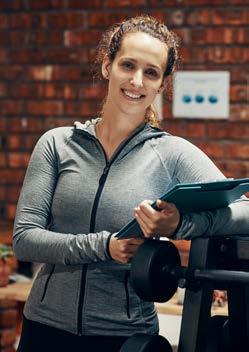
Nearly 600,000 thousand people work in the sport and physical activity sector and millions more volunteer on a regular basis. It’s a sector where the volume and quality of job opportunities is growing year on year, it’s not just all about delivering activity sessions though that is a large part of it, leaders and managers make up nearly 30% of the jobs available.
Senior Managers are individuals employed in the sport and physical activity sector who can take substantial responsibility for people, portfolio of programmes, projects, operations and/or services to deliver long term organisational success, with the professional recognition of their ability to deliver impact and demonstrate their commitment to continual learning and development. The role of the Senior Manager is to lead, plan and implement initiatives to achieve organisations strategic priorities. The term senior manager covers roles such as National Manager, Regional Manager, Chief Operating Officer, Chief Executive Officer, Managing Director, Board Director, Trustee, Regional Directors, Senior Leaders, Nonexecutive Directors.
This category was introduced for sport and physical activity leadership. It has two separate levels; Chartered Management Member and Chartered Management Fellow.
By gaining this designation, and adding the widelyrecognised MCIMSPA(ch) or FCIMSPA(ch) to your name, you demonstrate a strong ability to lead the sector, and show a strong understanding of ethics and a commitment to continuing professional development.
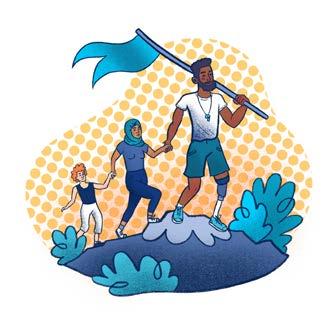
There are lots of opportunities and options to become a professionally recognised leader or manager.
Vocational qualifications. Qualifications in leadership and management are provided by independent training providers, there are lots of them out there offering qualifications such as a level 3, 5 or 7 diploma in leadership and management. When seeking a provider make sure they are endorsed by CIMSPA the professional body, you should see our logo on the advertising and course materials.
Apprenticeships. You can learn on the job; you can access a leisure duty manager apprenticeship or an operations or chartered management apprenticeship.
Degree programmes. Some universities within their degrees have embedded the skills needed to be a leader or manager, not all universities and degrees have done this though so where that is the case, you’ll see the CIMSPA logo on the university and degree programme advertising and course material so make sure you look carefully.
Its increasingly important when working as a leader or manager you need to be professionally recognised by your professional body – CIMSPA. Most employers will have it as a requirement for working for them and increasingly customers expect it. Below are the professional recognition options and the career pathway for leaders and managers.
Student recognition - Aspiring Manager recognition - Entry Manager recognition
General Manager recognition - Senior Manager recognition - Chartered Manager recognition
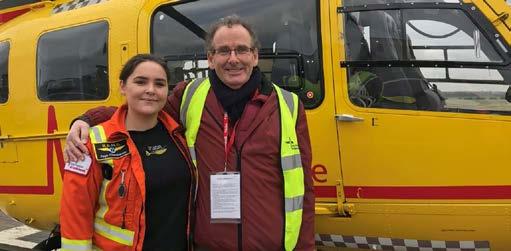
Individuals who are passionate, professional and competent drive the success and growth of the physical activity sector. They inspire and enable our nation to be active.
Andy Read, an ardent campaigner for defibrillators in leisure facilities, was until recently Head of Safety at Places Leisure.
Could you briefly outline your background?
“I’ve worked in the industry since I was 16, starting part-time as a lifeguard. I worked with local authorities until I was 26. Then I worked my way up, becoming a manager in the 1980s. I’ve worked in the private sector, managing local authority facilities ever since.”
Can you tell us a bit about what happened to you a few years ago?
“Three years ago, I had a cardiac arrest. Luckily, I survived but I thought, ‘what am I going to do now?’
A real passion for me is my hometown and we wanted to get defibrillators within two minutes of nearly every home and every business there. We have 16 or 17 defibrillators in my town now and I very much hope by 2025 we’ll have 25.”
What needs to change to make sure defibrillators are on the frontlines of the sport and physical activity sector?
“I think it’s got to come back to education and awareness. They are easy to use. You open them up and they tell you what to do. But people are a little bit scared of them - they’re a bit worried and cautious, which is understandable. Every leisure centre in the UK should have a publicly accessible defibrillator outside their facility. They’re community hubs so are the perfect place for defibrillators.”
What one piece of advice would you give to others currently going through what you went through?
“Work on marginal gains. I decided there were three things that were important - green trees, blue skies, and smiling faces. I took every opportunity to get back into fitness. I had CBT therapy, went to a support group, and had counselling, because the mental side of it was tough. I thought, after the cardiac arrest, I’m going to struggle on a bike, so I bought an e-bike. I do yoga, pilates, and walking football too. Fitness is crucial.”
Is there anything else you would like to add?
“Everyone is responsible for making sure there are more defibrillators in their local communities. I’m passionate about getting them out there, and them saving peoples’ lives”
Chartered status is a mark of excellence and allows you to
demonstrate your professionalism and impact.
A member is a professional who meets sector standards in their particular occupational scope. Their role demands the practical knowledge, skills and behaviours as well as the occupational qualification to underpin competencies.
A chartered member combines the above with a thorough (and assessed) understanding and demonstration of broad, multidisciplinary expertise.
Chartered status is valued by employers throughout the UK and is a publicly recognised term that will give you greater respect and recognition. The chartered assessment process is a great opportunity for you to test your skills and knowledge, identifying your strengths and areas for development. Our assessors are experienced professionals who will support, guide, and test you through the chartered assessment process.
CIMSPA has chartered opportunities in the following occupations:
Chartered Manager has two separate levels: Chartered Management Member and Chartered Management Fellow.
By gaining this designation, and adding the widelyrecognised MCIMSPA(ch) or FCIMSPA(ch) to your name, you demonstrate a strong ability to lead the sector, and show a strong understanding of ethics and a commitment to continuing professional development.
The assessment can be completed around your current work. During the route to chartered status you will be assigned a chartered assessor and mentor who will guide you throughout.
Upon completion, you will receive a chartered certificate recognising your success. You can then go on to work towards becoming a Chartered Management Fellow.
Chartered Activity and Health Practitioner is a nationally-recognised hallmark of a qualified and excellent professional. It is open to everyone who has sufficient experience in the industry and can be completed online.
The assessment can be completed around your current work. During the route to chartered status you will be assigned a chartered assessor and mentor who will guide you throughout.
Upon completion, you will receive a chartered certificate recognising your success.
Personally, the chartered status membership gives me immense confidence that I have maintained the highest professional standards throughout my dedicated career working with older adults. Professionally, it demonstrates my professional competence and excellence, skills and expertise to work with health practitioners, carers, GPs and researchers.
David Langford MCIMSPA(ch) Research Associate for Aberystwyth Stroke Research Group
As a Chartered Member or Fellow of CIMSPA you will have access to exclusive benefits that show your achievement to the rest of the sector including:
• Post-nominal letters - For Chartered Member: MCIMSPA (chartered) and for Fellow: FCIMSPA (chartered)
• Your entry in the CIMSPA membership directory - a statement to employers and the public of your professionalism.
• Your verified online profile, shareable with employers and customers.
• CIMSPA Academy - access to FREE endorsed CPD eLearning.
• Recognition and status - you are a Chartered Member/Fellow of the of the sector’s only chartered professional body.
• Record of professional development - share your status with employers and customers.
• The right to use our personal membership logos.
• Print copy of S&PA Professional, the quarterly CIMSPA magazine and access to our digital archive.
• CIMSPA member bulletin - curated selection of guidance, useful resources and news.
• S&PA Extra - our magazine’s monthly digital newsletter.
• Sector job vacancy information
Services, activities, and venues that improve people’s physical fitness.

The exercise and fitness industry is a vibrant and growing place to work, opportunities are endless. You can work full, part time, casually or selfemployed. If you have a passion for helping improve people’s fitness, mental and physical wellbeing a job in this industry would be great for you.

From the chair of the Exercise and Fitness Professional Development Committee, Marcus Kingwell (FCIMSPA) Chief Executive of EMD UK, the national governing body for group exercise.
The Professional Development Committee for Exercise and Fitness is made up of industry employers, education providers and technical experts.
I chair the committee and I’m fortunate to be supported by representatives from organisations such as Virgin Active, the NHS, Life Fitness, Active IQ, Future Fit Training, Cardiff Metropolitan University and others in developing and defining our industry skills plan. We’ll be defining the roles in exercise and fitness, how many people the sector needs now and in the future and what skills they need. We’re responsible for writing and updating the professional standards for occupations such as Personal Trainer, Group Exercise Instructor and Fitness Manager. These professional standards set out what employers need from staff in terms of knowledge and skills to do their job safely and effectively. We also make sure that the right quality training opportunities are available by overseeing endorsement of qualifications and the development of new apprenticeships.
Working in exercise and fitness is vibrant, exciting and flexible. Job roles are a lot more diverse than you might think: you might work in a gym, leisure centre, community venue, park, school or care home; your customers could include older people, people with long term health conditions or mother and babies, as well as folk who just want to get fitter.
Working in fitness is also incredibly rewarding as you’ll be making real differences to people’s lives.
Many fitness professionals will work with a broad range of customers and places but may have specialist expertise in working with one or more groups of customers or different places. Options to specialise include.
• Working with people with long term conditions.
• Working with anti and post-natal women.
• Working with children.
• Working inclusively – working with disabled people.
• Working with inactive people.
• Working in Schools.
• Working in communities.
80,680 people are employed as fitness instructors
£45 per hour industry average charge for a Personal Trainer
£33,927 average salary of someone working in a fitness facility
67% increase in self-employment since 2016
Personal Trainer - they offer individual and small group coaching sessions.
Group Exercise Instructor - they deliver exercise & wellness classes such as, group cycling, body conditioning, dance fitness, water workouts, yoga, Pilates or Tai Chi.
Fitness manager - manage the activity in a fitness facility supporting their instructors to deliver activities for customers.
There are a broad range of jobs in exercise and fitness. You can work with people from all walks of life to help and support them achieve their exercise, fitness, and wellbeing goals. From working with Mums and Toddlers in the park, to supporting someone waiting for surgery, to the more tradition delivering a fitness class in a gym or community hall. The opportunities are vast. Below are a few of the different types of jobs in exercise and fitness.
The role of the Gym Instructor is to engage, facilitate, educate, and support clients in the gym environment.
• Plays a key role in customer experience and member retention, motivating clients to adhere to exercise to support long-term, health-related behaviour change.
• Uses their technical knowledge to conduct assessments, consultations, and inductions, providing sound demonstrations of gym-based exercise and equipment.
• Conducts pre-exercise screening and when individuals should be referred to other exercise or health professionals.
• Plans safe and effective gym-based engaging, varied and progressive exercise programmes to meet clients’ needs and goals.
• Provides positive customer experiences by routinely ‘walking the gym floor’ to engage and build rapport with clients and to support safe and effective exercise techniques.
• Have responsibility for health and safety and cleaning relevant to their role within the gym environment.
• Works independently and as part of a team.
• Is the first point of contact, providing high levels of customer care, service excellence, taking responsibility for the customer experience.
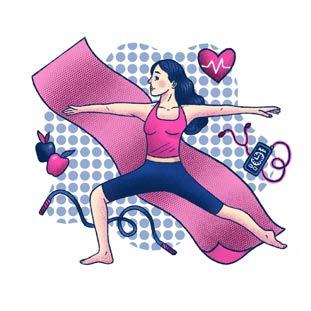
• Works over a seven-day week that may include weekends, early mornings, evenings and public holidays and will report to the fitness/leisure manager.
Health navigators signpost and support new or returning participants to physical activity or other lifestyle interventions. They routinely provide inclusive, person-centred brief advice to the public, having the knowledge, capacity, and ability to signpost to other local services and professionals where appropriate. An intervention could range from an opportunistic very brief advisory conversation of 30 seconds to an extended brief intervention of approaching one hour.
You
can work with people from all walks of life to help and support them achieve their exercise, fitness, and wellbeing goals... The opportunities are vast!
The role of a Personal Trainer is to coach clients (on a one-to-one and small group basis) towards their health and fitness goals through the planning and delivery of creative and personalised exercise programmes and instruction, nutritional advice and overall lifestyle management.
This occupation exists within a sector that plays an important role in improving the health of the nation, creating opportunities that get more people, more active, more often.
• Analyse clients’ needs, adapting and modifying guidance to motivate clients to positively change their behaviour and improve their overall wellbeing.
• Refer clients to relevant professionals for specialist information and guidance when required (e.g. physiotherapist, registered dietician, medical specialist).
• Has a comprehensive understanding of business, finance, sales and marketing to build and retain a stable client base.
• Employed by a fitness or leisure centre or, once qualified, can be self-employed and should expect to work hours that may include evenings, weekends and public holidays.
Group Exercise Instructors are fitness professionals who teach, lead, and motivate groups of individuals through intentionally-designed, prechoreographed exercise classes. Categories include: strength and body conditioning (e.g. BODYPUMP™, body conditioning, core stability), cardiovascular (e.g. Spinning®, indoor cycling, step aerobics, BODYATTACK™), holistic (e.g. yoga, Pilates, BODYBALANCE™, tai chi), dance fitness (e.g. Zumba®, BODYJAM™, street dance, dance aerobics), water workouts (e.g. Aqua Zumba®, aqua aerobics) and dance (e.g. ballroom, Latin, country and western, folk).
• Provides instruction across many class types and equipment sets, from aerobics, step and group exercise.
• Chooses the music and designs the choreography.
Chartered Activity and Health Practitioners specialise in working with people with long term medical conditions, normally have specialist knowledge in a specific longterm condition such as, Cancer, Cardiac Rehabilitation, Neurological Conditions, Pulmonary Rehabilitation or falls prevention. They understand how exercise can support people with long-term conditions.
There are lots of opportunities and options to become a professionally recognised fitness professional.
Vocational qualifications. Qualifications in fitness instructing, group exercise and personal training are provided by independent training providers, there are lots of them out there offering qualifications such as a level 2 in gym instructing or level 3 in personal training. When seeking a provider make sure they are endorsed by CIMSPA the professional body, you should see our logo on the advertising and course materials. Some vocational qualifications provided by further education colleges such as the BTEC qualifications will qualify you to become a fitness professional, make sure they carry the CIMSPA badge.
Apprenticeships. You can learn on the job; you can access a gym instructor qualification as part of the Leisure Team Member apprenticeship and there is a specific apprenticeship in Personal Training.
Degree programmes. Some universities within their degrees have embedded the skills needed to be an exercise and fitness professional, not all universities and degrees have done this though so where that is the case, you’ll see the CIMSPA logo on the university and degree programme advertising and course material so make sure you look carefully.
It’s increasingly important when working as a fitness professional, you are professionally recognised by your professional body – CIMSPA. Most employers will have it as a requirement for working for them and increasingly customers expect it.
Below are the professional recognition options and the career pathway for fitness professionals.
Student recognition - If you are studying to become an exercise and fitness professional this is the recognition for you.
Practitioner recognition - Once you have qualified as an exercise and fitness professional you will be eligible to be recognised as a practitioner. This is for, Gym Instructors, Group Exercise Instructors (including Yoga, Pilates, and Tai Chi/Qigong) & Personal Trainers.
Senior/Chartered Activity and Health Practitioner recognition - Once you have established yourself as a fitness professional and taken extra qualifications and training in specialist areas you will be able to gain a higher level of recognition.

We welcome Kayley Stabler MCIMSPA(ch), who became CIMSPA’s first Chartered Activity and Health Practitioner member earlier this year, to discuss why she decided to achieve chartered recognition.
Could you briefly outline your background and why you decided to apply for chartered status?
I’m a personal trainer by trade and used to be a strength and conditioning coach, undertaking a lot of work with athletes. Now I want to move more into working with medical conditions and I needed something to recognise the role.
Why should current professionals join CIMSPA and apply for chartered status?
It’s super beneficial for both personal trainers and potential clients because of the recognition it comes with – having an externally validated status that sets you apart from others and keeps the industry standard.
What are the most appealing chartered benefits to you and what impact will they have on you?
The industry recognition is the top benefit for me and hopefully the sector will progress as this process is rolled out further. It’s great to be a part of an industry that has a level of accountability.
What does chartered status mean to you personally/professionally?
Personally it has boosted my confidence. We all have those days where you question ‘Is this the right thing to do?’. It’s nice to be validated and have a good standard of the job that you do. Moving forward, I hope clients have the same confidence in my abilities.
Why is it important that chartered members are recognised for the work they’ve done?
Clients can identify your sharpened status and it increases their confidence in your work. It shows that you’ve undergone a process that checks on the level of work you’ve done.
Do you have any advice for those thinking of applying for chartered status?
Go for it. I was a bit hesitant about it; thinking I wasn’t good enough or I wouldn’t pass. Even if I hadn't I would have learned so much because it highlights your strengths and weaknesses, and you can take those weaknesses and work on them.
How did you find the chartered process?
Identifying my strengths and weaknesses was the most beneficial part for me. Overall, it was a really smooth process that didn’t take away from my day-to-day work too much.
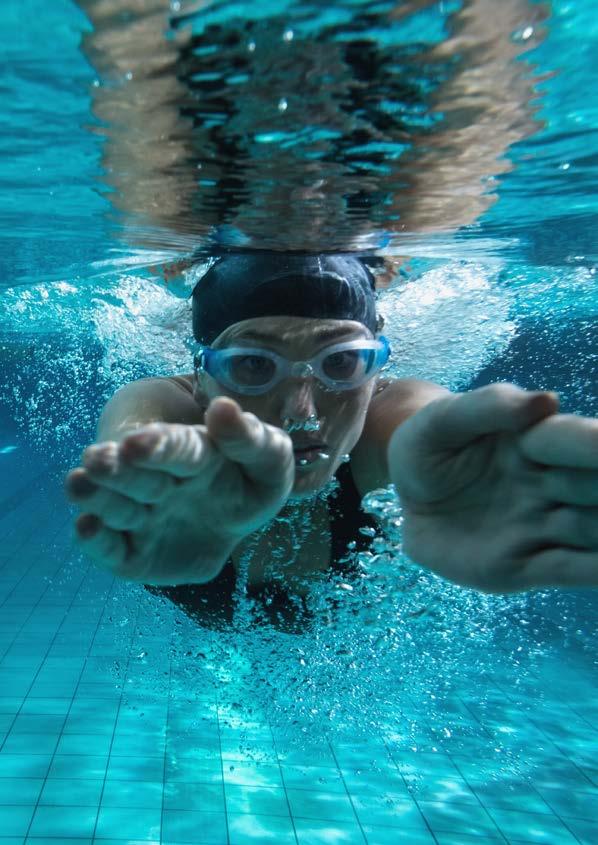
Leisure Operations Services, activities, and venues that provide opportunities to improve participation in physical activity.
The Leisure Operations industry is a great place to work, with fantastic community facilities from skate parks to swimming pools to ice rinks. If you want to work as part of a vibrant team to provide opportunities for people to take part in sport and physical activity this could be the place for you.

From the chair of the Leisure Operations Professional Development Committee. Ian Gray (FCIMSPA)
Leisure Operations and Development Manager, Hartlepool Borough Council.
The Professional Development Committee is made up of industry employers, education providers and technical experts.
As chair of the committee, I’m supported by representatives from organisations such as, The Royal Lifesaving Society, Everyone Active, Ipswich Borough Council, Swim England, Leeds Beckett University, The Swimming Teachers Association & others to develop and define our industry skills plan, we want to know how many people work in leisure operations and how many we’re likely to need in the future and what skills they will need. We wrote and keep up to date the professional standards for occupations such as, Recreation Assistant, Swimming Teacher & Leisure Duty Manager they outline the knowledge and skills we as employers know our people will need as the minimum to do their job safely. We also make sure there are enough of the right quality training opportunities available by overseeing endorsement of qualifications and training and reviewing existing and developing new apprenticeships.
Working in Leisure Operations can be very rewarding and has a very clear career pathway from working in the day-to-day operations through to managing a single site all the way to CEO of the organisations operating multiple facilities. Your skills are also recognised as valuable in other industries
Swimming Teachers will work with a broad range of customers and places but may have specialist expertise in working with one or more group of customers or different place. Options to specialise include.
• Working with Children 0-5
• Working with people with long term conditions.
• Working with anti and post-natal women.
• Working inclusively – working with disabled people.
• Working with inactive people.
• Working with Schools.
64,670 people are employed as leisure managers
12,365 employers are hiring people
35,400 people are employed as leisure assistants
41,000 new jobs have been created since 2003
Top three jobs in leisure operations.
Recreation/Leisure Assistant – they support the effective running of facilities.
Swimming Teacher – they deliver swimming lessons, mostly to children.
Leisure Operations manager – they manage the facility and its people.
There are a broad range of jobs in leisure operations. You can support the effective running of facilities such as leisure or community centres, swimming pools, ice rinks, or sports pitches or stadiums. The running of sports facilities is very hands on, and things can change from one minute to the next making it an exciting place to work.
Most jobs in this sector involve rota working including weekends, early mornings, evenings and public holidays. They also need to offer high levels of customer care.
Below are a few of the different types of jobs in leisure operations.
The role of the Recreation Assistant is to support, enhance and deliver the day to day operations of a leisure facility. These operations typically service sport and activities in wet environments such as swimming pools, water slides and saunas and/or dry environments such as activity areas and sports pitches. Working as part of a team, a Recreation Assistant undertakes a range of operational duties such as assisting with the opening and closing of the facility, maintaining the cleanliness and safety of the environment and ensuring programmed activities and services are available. They will usually report to the leisure duty manager.
The role of the Lifeguard is to facilitate a safe environment to enable users to participate in a range of water-based activities. They will typically work in environments such as swimming pools, inland water and beaches and will safely supervise a range of aquatic activities using equipment and features specific to each environment. Working as part of a team the Lifeguard is responsible for the safe supervision, prevention, intervention and rescue of users within their care. The Lifeguard will report to a supervisor or manager.
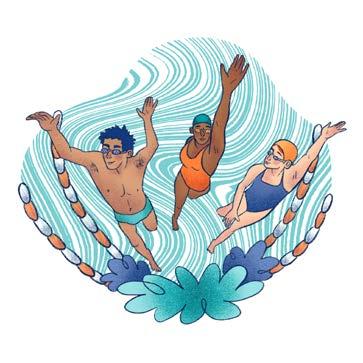
The role of the Swimming Teacher is to plan, deliver and evaluate a series of swimming lessons providing a safe learning environment. They develop water confidence, safety and technical skills in a range of participants of different abilities, from non-swimmer to advanced. Swimming Teachers provide the learner with core aquatics skills and a range of pathways for continuous development. They also support the promotion and awareness of swimming opportunities and must be able to supervise and lead assistant teachers.
The role of the Assistant Swimming Teacher is to provide a fantastic experience to people learning to swim by delivering fun, safe and inclusive swimming activities. They support the swimming teacher in the delivery of swimming lessons to participants of all ages and abilities. They ensure participants, regardless of ability, build confidence in the water and develop core aquatic skills.. Assistant Swimming Teachers assist the delivery of pre-planned activities to a small group of participants across the full range of development stages under the supervision of the Swimming Teacher.
The role of a Pool Plant Operative is to manage the pool plant and surrounding amenities, ensuring a safe working environment is maintained and all legal requirements are adhered to. Examples of employers include local authorities, schools, private pool owners, leisure trusts, facility management companies, holiday parks, NHS and hotels. Pool Plant Operatives fulfil an important role in improving the standard of pool plant operations and ensuring the safety of bathers, staff, contractors, and other people in the pool environment.
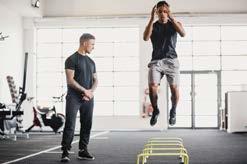
Leisure Managers are individuals employed in the sport and physical activity sector who are experienced managers. They manage the processes through which organisations plan and organise quality sport and physical activity services. They efficiently deploy financial and physical resources and have leadership skills at the operational level, whilst being able to contribute to strategic planning and manage change.
Chartered leisure managers have demonstrated their ability to excellently operate as a leisure manager, not just by being effective in their role but as strategic leaders in the sector. They make fundamental and significant changes which affect not only their business but wider communities.
There are lots of opportunities and options to become a professionally recognised leisure professional. Vocational qualifications. Qualifications in lifeguarding, swimming teaching pool plant operations and management are provided by independent training providers, there are lots of them out there offering qualifications such as a level 2 in lifeguarding or level 3 in entry management. When seeking a provider make sure they are endorsed by CIMSPA the professional body, you should see our logo on the advertising and course materials. Some vocational qualifications provided by further education colleges such as the BTEC qualifications will qualify you to become a leisure operations professional, make sure they carry the CIMSPA badge.
Apprenticeships. You can learn on the job; you can access everything you need to enter the sector, such as a lifeguarding, swimming teaching and first aid qualification as part of the Leisure Team Member apprenticeship and there is a specific apprenticeship in Leisure Management. Degree programmes. Some universities within their degrees have embedded the skills needed to be a leisure manager not all universities and degrees have done this though so where that is the case, you’ll see the CIMSPA logo on the university and degree programme advertising and course material so make sure you look carefully.
Its increasingly important when working as a leisure operations professional you need to be professionally recognised by your professional body – CIMSPA. Most employers will have it as a requirement for working for them and increasingly customers expect it. Below are the professional recognition options and the career pathway for leisure operations professionals.
Student recognition - If you are studying to become a leisure operations professional this is the recognition for you.
Practitioner recognition - Once you have qualified as a leisure operations professional you will be eligible to be recognised as a practitioner. This is for, recreation assistants, lifeguards, assistant swimming teachers, swimming teachers and pool plant operators.
Management recognition - Once you have qualified as a leisure operations manager you can be recognised within that pathway (see Leadership and Management Section).
Chartered manager recognition - Once you have established yourself as a manager and taken extra qualifications and gained experience will be able to gain a higher level of recognition for your management skills.
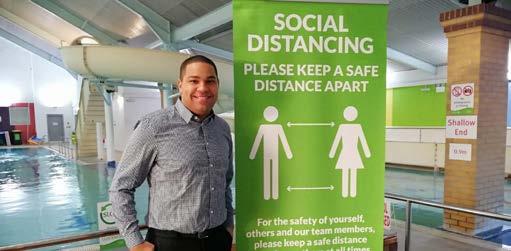
Kieran tells us about his career in the sport and physical activity sector, his future ambitions and his top tips for a successful career.
Could you briefly outline your background and current role?
After studying Tourism at college, I worked at the Ritz Hotel then joined Greenwich Leisure Limited (GLL), one of the UK’s largest leisure providers in 2008. Over the course of ten years, I worked my way through a number of roles starting as an admin officer before progressing through to a general manager.
GLL [a current CIMSPA employer partner] was very supportive in helping develop professionally and identify a clear progression route. During this time I developed my skills by gaining my NPLQ and I also completed a BA (Hons) in Sport Management from Loughborough College. At this time I was a member of the Institute of Sport and Recreation Management (IRSM), which was the predecessor of CIMSPA.
In 2018, I relocated to Clacton on Sea joining Tendring District Council, which operates their own facilities in Essex areas. I started as a Sport Facilities and Development Manager but recently transitioned into
the role of Sports Facilities Business Manager. My new role brings back my passion for travel and tourism (we have over six leisure facilities), and allows me to get involved in other aspects of the business.
What are your future ambitions and goals?
I am enjoying working in a team that covers a much wider remit that allows me to be involved and support other aspects of the Council including theatre, the seafront and events. This gives me a completely different perspective and has reignited the interest I had in my youth in travel and tourism.
What does it mean to be part of the sector’s only Chartered Institute?
I feel it is important to be part of a membership body that focuses on representing our workforce and our sector as a profession. It’s about being recognised for a level of standard and competencies. It has opened up the sector for me and gives customers, participants, employees, clients, and colleagues confidence in your skills is invaluable.
A CIMSPA membership shows your commitment and gives your customers and participants confidence in you, your skills and knowledge.
Sport/skill based services, activities and venues that increase participation and develop skill, sometimes targeting under represented groups and inequalities.
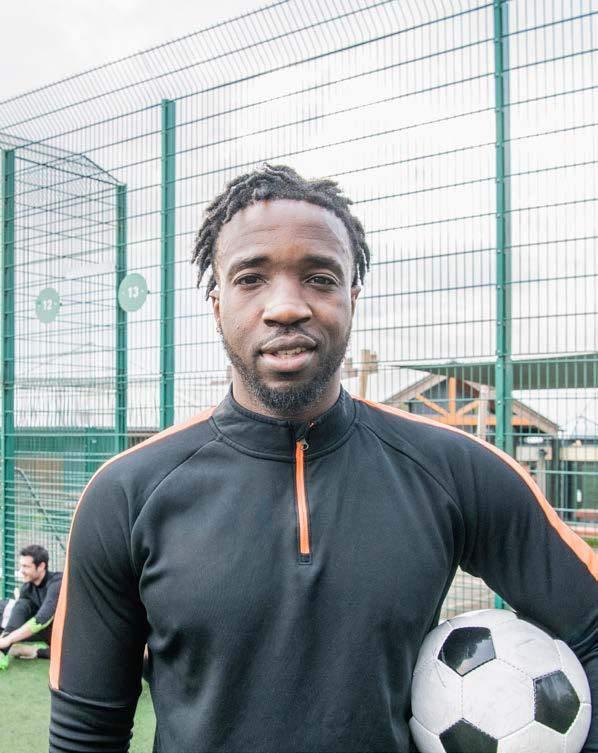
The community sport industry is a vibrant and growing place to work, opportunities are endless. You can work full, part time, casually or selfemployed. There are also lots of voluntary opportunities available for you to do alongside your day job. If you like to see people gain new skills and achieve their goals this would be a fabulous career route for you.
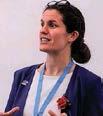

From the chairs of the Community Sport Professional Development Committee. Emily Reynolds, National Programmes Director, The Youth Sport Trust & Andy Heald, Sportivity.
The Professional Development Committee is made up of industry employers, education providers and technical experts.
As chairs of the committee, we’re supported by representatives from organisations such as, The Rugby Football Union, UK Coaching, Streetgames, Active Essex, uk active, British Blind Sport, Coach Core, University of Brighton & others to develop and define our industry skills plan, we want to know how many people work in community sport and how many we’re likely to need in the future and what skills they will need.
We wrote and keep up to date the professional standards for occupations such as, Sports Coaching Assistant, Sports Coach & School Sport Coach they outline the knowledge and skills we as employers know our people will need as the minimum to do their job safely. We also make sure there are enough of the right quality training opportunities available by overseeing endorsement of qualifications and training and reviewing existing and developing new apprenticeships.
Working in community sport provides is just a rewarding career but gives you the opportunity to see people learn and grow new skills and you can share in their fulfilment as they achieve their goals. There are hundreds of thousands of volunteering opportunities and paid and full-time roles are increasing year on year.
Many sports coaches will work with a broad range of customers and places but may have specialist expertise in working with one or more groups of customers, sometimes in many different places. Options to specialise include:
• Working with people with long term conditions.
• Working with anti and post-natal women.
• Working with children.
• Working with children 0-5
• Working inclusively – working with disabled people.
• Working with inactive people.
• Working in Schools.
• Working in communities.
Over 3 million people have coached sport
101,880 people are employed as sports coaches
19% of sports coaches are self-employed
26,000 new jobs created since 2003
Sports Coach – engage people in sports coaching sessions.
Coaching Assistant - Supports the sports coach to deliver coaching sessions.
Sports development manager - Manages the delivery of sporting initiatives and people delivering sports activity.
In community sport you can work with all sorts of people who want to take part in sports activity you could work in your local community sports club coaching boxing or tennis, or work in a school to deliver before or after school activities, or manage or coordinate sports competitions. The opportunities are endless, if you like sport and helping others to have fun and be successful this could be the ideal career for you.
Below are a few of the different types of jobs in community sport.
A Coaching Assistant will improve a participant’s experience of sport and physical activity by supporting a coach to provide specialised support and guidance aligned to their individual needs. Coaching Assistants can, and do, have an inspirational effect on individuals, groups and communities.
The role of Coaching Assistant is to support the Coach in the delivery of their activities. The participant’s development as a person is central to the Coaching Assistant’s activity. They may deliver part of a coaching activity under supervision. The role includes:
• Assist the Coach with the provision of a high quality positive experience, especially where there are large groups or those with additional needs.
• Assist in the preparation, delivery, continuous evaluation and review of sport and/or physical activity sessions.
• Ensure the culture and environment is designed to meet participant welfare needs, allowing them the opportunity to achieve their goals and meet their aspirations.
• Tailoring to participants’ needs and taking an inclusive approach.
Coaching Assistants work with participants as well as a range of others, such as: coaches, other coaching assistants, colleagues, volunteers, parents, teachers, youth workers and health professionals to ensure the experience is the very best it can be.
By meeting these high standards, Coaching Assistants will be able to work with a broad range of participants with different needs in different types of environments. They will have demonstrated the ability to work with a group of participants in an environment to suit their needs over a period of time sufficient enough to show improvement against an individual’s needs and aspirations.
Coaching Assistants can, and do, have an inspirational effect on individuals, groups and communities.
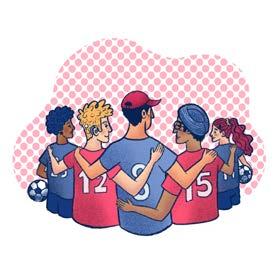
A community sports coach will improve a participant’s experience of sport and physical activity by providing specialised support and guidance aligned to their individual needs.
Coaches can, and do, have an inspirational effect on individuals, groups and communities. Every participant’s personal development is central to the Coach’s activity. Their role includes:
• Leading planning, preparation, delivery, continuous evaluation and review of a series of sport and/or physical activity sessions.
• Ensure the culture and environment is designed to meet participants’ welfare needs and allows them the opportunity to achieve their goals and meet their aspirations.
• Tailoring to the participant’s needs and taking an inclusive approach.
They work with participants, and a range of others, such as: coaches, colleagues, volunteers, parents, teachers, youth workers and health professionals, to ensure the experience is the very best it can be.
Coaches that meet this standard will be able to work with a broad range of participants with different needs in different types of environments. They will have demonstrated the ability to work with a group of participants in an environment to suit their needs over a period of time sufficient enough to show improvement against an individual’s needs and aspirations.
A sports development officer plans and organises sports projects and campaigns in order to get more people involved. They work towards making sport more accessible to everyone and aim to get people living a healthier lifestyle. They may specialise in a particular sport or focus on a particular group of people, or have a more general remit.
Typical job responsibilities include:
• organising, developing and delivering a varied range of sporting activities, projects or programmes
• finding funding and managing budgets
• producing promotional material and displays
• keeping statistical and financial records
• planning
• undertaking administrative tasks
• writing reports and press releases
• liaising and working with relevant organisations or agencies including youth services, schools, clubs, sports coaches and sports councils
• organising and undertaking market research
• monitoring and assessing progress
• finding and training coaches, volunteers and staff.
A school sports coach will know how to work with a range of children in a school environment in a way which suits the children’s needs and over a period of time that is sufficient enough to show improvement against the children’s needs and aspirations. Activities could include: after school clubs, holiday clubs and sports club sessions on a school site.
There are lots of opportunities and options to become a professionally recognised community sport professional.
Vocational qualifications. Qualifications in sports coaching, and sports management are provided by independent training providers and sport’s national governing bodies. There are many of them out there offering qualifications specific to a sport such as coaching football, gymnastics, tennis or boxing. When seeking a training provider make sure they are endorsed by CIMSPA the professional body. You should see our logo on the advertising and course materials.
Some vocational qualifications provided by further education colleges such as the BTEC qualifications will qualify you to become a sports coach or sports development officer, make sure they carry the CIMSPA badge.
Apprenticeships. You can learn on the job; you can access sports coaching qualifications as part of the level 4 apprenticeship in sports coaching (England only).
Degree programmes. Some universities within their degrees have embedded the skills needed to be a sports coach or sports development officer or manager. Not all universities and degrees have done this. Where they have, you’ll see the CIMSPA logo on the university and degree programme advertising and course material so make sure you look carefully.
It’s increasingly important when working as a community sport professional, you become professionally recognised by your professional body – CIMSPA. Most employers will have it as a requirement for working for them and increasingly customers expect it. Below are the professional recognition options and the career pathway for community sport professionals.
Student recognition - If you are studying to become a community sport professional this is the recognition for you.
Practitioner recognition - Once you have qualified as a community sport professional you will be eligible to be recognised as a practitioner. This is for sports coaching assistants and sports coaches.
Senior/Chartered Manager - Once you have established yourself as a professional and gained industry experience you can apply for professional recognition as a chartered manager.
STUDENT RECOGNITION
PRACTITIONER RECOGNITION
CHARTERED PRACTITIONER RECOGNITION
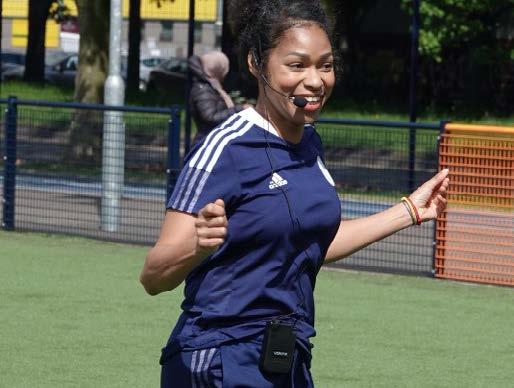
My role is to deliver and develop a wide range of high-quality physical activity and health-based opportunities to engage with women within an ethnic and culturally diverse inner-city community. We aim to enable them to get active through social interaction and community engagement. I Liaise with partner organisations to identify need and resources.
Additionally, I support the wider activities we deliver including; our Healthy Goals Programmes, School Sport/Physical Activity delivery and This Girl Can projects.
Excellent interpersonal skills, ability to work on my own initiative, motivational and encouraging to enthuse the individuals I coach.... lead by example, resourceful/ committed and creative, have an open mind to seize opportunities that would develop me and my coaching skills, ability to adapt to changes.
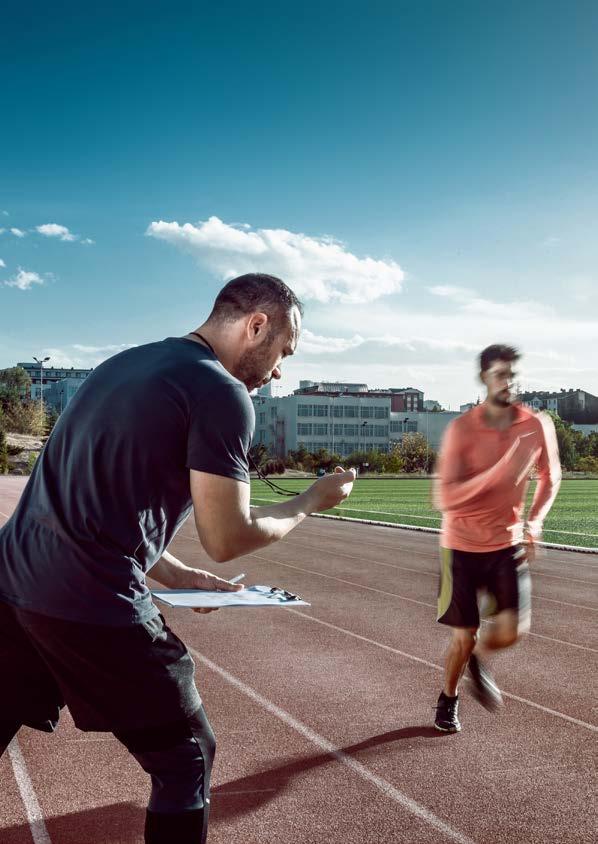
Competitive sport and activities including those in which athletes receive payment for their performance; professional, semiprofessional and grass roots sport.
The professional sport industry is a highly competitive, fast paced innovative place to work. You could be working with the highest-level athletes to help them achieve their goals or supporting the delivery of international competitions, or making sure spectators are safe and have a fantastic experience. If you like elite sport and to challenge yourself every day to be the best you can be this could be the industry for you.
There are lots of other roles in performance sport these include.
• Sports Therapist or Rehabilitator • Sports Official
25,000 people are studying sports science right now
40% of paid sports coaches are under 35 years old
171 million hours of coaching delivered per week
High Performance Sports Coach – work with elite and professional athletes to excel in their sports performance.
Strength and Conditioning Trainer – devise strength and conditioning programmes to support athletes to achieve their goals.
Sport Scientist – Physiologists, Psychologists and Biomechanists apply scientific principles to advance performance.

From the chair of the Professional Sport Professional Development Committee. Jay Roper, Senior Coaching Advisor, UK Sport.
The Professional Development Committee is made up of industry employers, education providers and technical experts.
As chair of the committee, I’m supported by representatives from organisations such as, The England and Wales Cricket Board, British Gymnastics, UK Strength and Conditioning Association, The British Association for Sport and Exercise Science, Great Britain Hockey, The English Institute of Sport, Hartpury University & others to develop and define our industry skills plan, we want to know how many people work in professional sport and how many we’re likely to need in the future and what skills they will need. We wrote and keep up to date the professional standards for occupations such as, High Performance Sports Coach & Strength and Conditioning Coach they outline the knowledge and skills we as employers know our people will need as the minimum to do their job safely. We also make sure there are enough of the right quality training opportunities available by overseeing endorsement of qualifications and training and reviewing existing and developing new apprenticeships.
Having a committee made up of employers, education providers and industry experts enables us to ensure we have taken every aspect into account when we are making decisions that affect people’s job prospects and the skills and competencies required of the professional sport workforce. We’ve seen incremental increases in standards which is having a direct impact on athletes’ performance, powering success and inspiring impact.
Working in professional sport is incredibly exciting, with major events such as the Olympics, commonwealth games and the calendar of professional sports events happening all year round in multiple sports there literally are hundreds of thousands of opportunities to achieve personal excellence in a rewarding career.
There are a broad range of jobs in Professional Sport. You can work with elite or professional athletes directly as part of a coaching team as a sports coach, strength and conditioning coach, sport scientist or performance analyst. You can support the delivery of sporting competitions in management and administration of elite sport as a performance manager or director or you can help to organise and deliver sports events as an event organiser or team director. Below are a few of the different types of jobs in performance sport.
Front-line coaches who work in a high-performance sport environment are individuals employed or deployed in the sport and physical activity sector who coach performance and/or elite athletes/players. They work across all professional and elite sport they’ll often be employed by professional sports clubs or organisations that support athletes that perform at major games such as the Olympics or world championships.
A Strength and Conditioning Coach will improve a participant’s experience of sport and physical activity by providing specialised support and guidance aligned to their individual needs. All this is provided within the context of the physical preparation for a performanceorientated goal. In summary:
• Strength and Conditioning Coaches support individuals and groups to achieve their performanceorientated goals by leading or assisting on the planning, preparation, delivery, continuous evaluation, review and adaption of strength and conditioning programmes. These programmes should be underpinned by scientific principles, evidence-based research and the athlete’s needs.
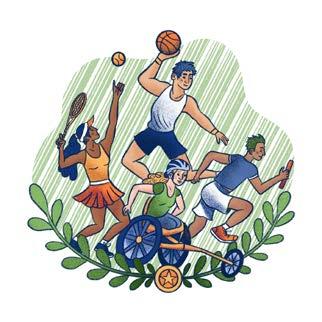
• Strength and Conditioning Coaches that meet this standard will be able to work with a broad range of healthy and injured individuals (e.g. elite and recreational athletes, youth, adults, disabled, etc.) all of whom will require different needs in different types of environments.
• They ensure the culture and environment is designed to meet an individual’s and/or group’s welfare needs and allow them the opportunity to achieve their goals and meet their aspirations. This means tailoring to the specific needs and requirements as part of a collaborative and iterative process and understanding the risk versus reward conundrum as and when appropriate.
• They may work independently or as part of a multidisciplinary team, which may include technical coaches, sport scientists, physiotherapists, nutritionists, psychologists and medical specialists. As such, they are aware of when to seek specialist advice, work collaboratively and when to refer individuals to the relevant appropriate professionals.
There are three types of sport scientist you can specialise in Physiology, Psychology or Biomechanics. Sports Scientists normally work alongside coaches and other medical staff to apply scientific principles to sports performance.
The science of sport attempts to answer questions such as:
• What happens to the body during physical activity?
• How and why do injuries occur?
• How does the body and mind react in extreme environments?
• How can athletes improve their performance?
Will analyse sports performance, they may record training sessions and competitions, produce reports on the opposition in team sports, code and edit match footage to provide reports on individuals performances, and use statistics to create trend analysis. This will help to inform the athletes and the coach on the quality of their performance.
There are lots of opportunities and options to become a professionally recognised when working in performance sport.
Vocational qualifications. Qualifications in sports coaching, and strength and conditioning are provided by independent training providers and sport’s governing bodies. When seeking a provider make sure they are endorsed by CIMSPA the professional body, you should see our logo on the advertising and course materials.
Apprenticeships. You can learn on the job; if you have coaching experience and qualifications already you can access a level 4 apprenticeship in sports coaching.
Degree programmes. Some universities within their degrees have embedded the skills needed to be a high performance coach or strength and conditioning professional, not all universities and degrees have done this though so where that is the case, you’ll see the CIMSPA logo on the university and degree programme advertising and course material so make sure you look carefully. When selecting a sports science course also check it has been endorsed by the British Association for Sport and Exercise Science (BASES).

Its increasingly important when working as a professional you need to be professionally recognised by your professional body – CIMSPA. Most employers will have it as a requirement for working for them and increasingly customers expect it. Below are the professional recognition options and the career pathway for performance sport professionals.
Student recognition – if you are studying to become an performance sport professional this is the recognition for you.
Practitioner recognition – once you have qualified as a professional you will be eligible to be recognised as a practitioner. This is for sports coaches
STUDENT RECOGNITION
PRACTITIONER RECOGNITION
CHARTERED PRACTITIONER RECOGNITION
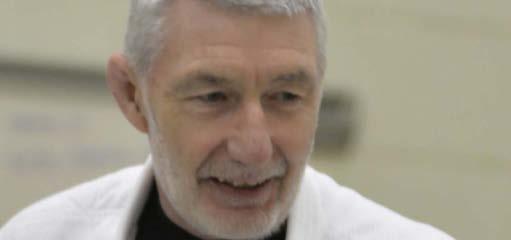
Could you briefly outline your background and current role?
“As co-founding director of the charity,The Fighting Chance Project (Scotland), my primary interest is to help young people with social, emotional or behavioural issues or other support needs to get their lives back on track. I am a Fellow of the Chartered Institute for the Management of Sport and Physical Activity (CIMSPA). As the former Chair of JudoScotland and Director of the British Judo Association, I now hold the position of Honorary Vice President of JudoScotland.”
What are your future ambitions and goals?
“My ambition is to see judo as a core sport within primary and secondary education in the UK. By emphasising judo values, their relevance to schools’ values and adjusting the coaching methodology to suit the needs of the participants, I believe we can make a significant contribution to closing the attainment gap and getting it right for every child.
What does it mean to be part of the sector’s only Chartered Institute?
“I have membership in other professional bodies - not for how that looks on a CV but the unspoken credibility membership offers. Given my ambition and goals, being accepted into CIMSPA was a big thing for me, but achieving FCIMSPA (Chartered) has been a pleasure and demonstrates my seriousness about professional development.”
How has being a CIMSPA member supported you to achieve or progress towards these goals?
“My preparation for my interview with Nick Sellwood and subsequent discussions on goals and objectives helped me re-evaluate my long term aim and purpose. The whole process was invaluable. The resources and links are also very useful for reference and new thinking.”
What one thing or piece of advice would you recommend to others currently in or entering a role like your own?
“Clear mindedness, determination and tenacity are essential attributes. Why? Because there will be many barriers in front of you.It is vital that you believe in the value and difference you can make and keep driving to achieve your objectives.”
Since being a CIMSPA member what has been the biggest benefit to you?
“I think during the extended periods of lockdown, I have made good use of online learning for CPD to refresh my knowledge and update my thinking.”
Do you have any advice for those thinking of applying for membership?
“Don’t hesitate! There is a membership level for everyone, and as part of a growing Institute, the networking and benefits can only get better!”
Jim Feenan is the co-founding director of The Fighting Chance Project (Scotland).
Training and supporting people who want to or who already work in the sport and physical activity sector.
There are lots of opportunities in education and training, whether you see that as a career progression or change of direction. Tutors, assessors and coach developers play a critical role in supporting people to enter the industries or progress along their career journey. If supporting people on their career path is something that motivates you education and training could be for you.
Working in training and education can be demanding but very rewarding, you can support people to achieve their career goals. You can work with people in their place of work, or in a school, college or university or support people remotely. Tutoring/lecturing and assessing are the most popular jobs where you work normally with young people to enable them to pass qualifications to enter the industry or get their next job. Its often a job you can do alongside your day job as an addition. Below are a few of the different types of jobs in education and training.
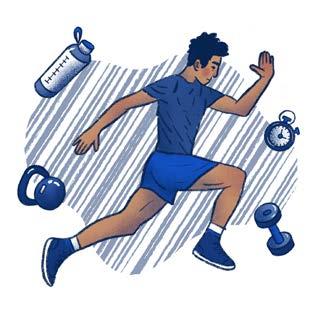
Tutor/lecturer – they impart knowledge to students.
Assessor – they assess competency of an individual normally in their workplace.
Coach Developer – support coaches to be better at what they do.
A Tutor will provide support and high-quality education programmes to learners to enable them to achieve the intended outcome of completing the programme/ course. Tutors will:
• Feedback on the delivery of any training to their employer / deployer / organisation when appropriate to ensure content is fit for purpose (highlighting content that is well received or a challenge for learners to understand).
• Monitor learner progress and provide ongoing feedback throughout the programme.
• Ensure that all learners feel welcome, respected, and their physical and psychological wellbeing is equal and safe in all learning and development environments.
• Create a collaborative learning environment – where tutors and delegates can learn from each other.
• Ensure the culture and environment is designed to meet a learners’ welfare needs and allow them the opportunity to achieve their goals and meet their aspirations.
• Tailor the teaching, learning and development needs of the learner to ensure inclusive approach is adhered to.
• Develop new training materials and resources for the relevant environment where needed.
• Obtain feedback from learners and employers to assess the effectiveness of training programmes.
• Ensure accurate completion of documentation.
• Review and identify own professional needs that includes role modelling life-learning habits and ensuring up to date subject matter and pedagogy knowledge.
• Support the process of embedding functional skills.
• Understand, adapt and implement different teaching and learning methods.
• Undertake progress reviews for each learner as and when required.
• Overcome barriers to learning and adapting delivery to meet the learners needs.
• Be occupationally competent in the area of delivery.
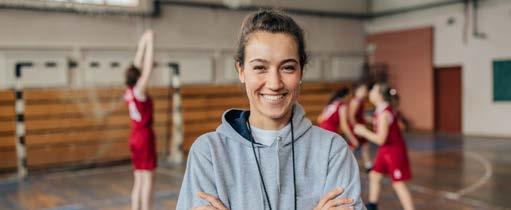
Coach developers are expert support practitioners who plan for, implement, and sustain strategies and interventions in support of skilled performance in sport coaching. Coach development practice takes a coach’s individual, work-related tasks and associated knowledge, skills and experiences as its starting point, preparing for and supporting learning and development with regard to both current and anticipated, future needs. It is an evolving process, reviewed as the relationship develops, and built on trust, mutual respect and professional curiosity. The coach developer’s work is educational, developmental, caring and support-oriented: interventions may include the development of technical skills, enhancing interpersonal relationships, evolving effective strategies to manage specific challenges and constraints, or a combination of these. Whatever the specific nature of a coach developer’s work might be, it will always be characterised by prioritising the health and well-being of the coach. It will also be collaborative, contextually situated, and concerned with helping coaches to develop active, critical knowledge and skills. Coach developers frequently work with other stakeholders that share a coach’s environment in order to support sustainable, long-term behavioural changes.
144,660 people are employed in education & training in the sport and physical activity sector
£29,675 is the average salary for working in education and training
The role of the Assessor is to:
• Be an advocate for the learner.
• Carry out formative and summative assessment according to the qualification or programme being assessed and to include remote and face to face learning.
• Support and assess the knowledge and occupational competence of learners.
• Organise and maintain documentation on learners.
• Support and advise learners to enable them to maintain engagement and motivation.
• Manage own workload.
• Support the employability of the learner.
• Ensure they have thorough knowledge of their occupational area and industry competence.
• Support learners to overcome barriers and adapt assessment to meet their needs.
• Implement and understand the dispensations and learning styles available to learners.
• Follow internal and external organisational requirements and regulations.
• Support learners to identify any barriers they may have and come up with solutions which provide fair and equal opportunities for everyone.
The role of the Work-based Assessor is to:
• Visit and observe a learner in their place of work to gather evidence towards a qualification.
• Manage a caseload.
• Work in partnership with employers to support the employers and learners needs.
• Liaise with the training provider as and when required.
• Maintain learner data.
• Adhere to relevant policies and procedures.
• Complete all relevant documentation in line with policies, procedures and compliance.
• Follow safeguarding procedures and understand the responsibilities of their role.
• Be able to work with groups and on a one-to-one basis.
• Support learners through their functional skills where appropriate.
There are lots of options when it comes to what and where to study here is a brief breakdown of the options available.
There are hundreds of qualifications and thousands of CPD opportunities available to enable to you get a job or advance your career in the sport and physical activity sector.
Unfortunately, not all qualifications and providers deliver the skills employers are looking for. If you’re thinking of studying a vocational qualification to be a lifeguard, swimming teacher, personal trainer or sports coach make sure your qualification and the training provider delivering the qualification are endorsed by CIMSPA. Look for the CIMSPA logo to be sure the training you study will be recognised by employers when you apply for a job.
The CIMSPA website, has details of all of the endorsed providers and qualifications and if you’re not sure get in touch.
A great way to get the qualifications you need to get a job in sport and physical activity is to study at college, your local college normally will have a few choices of sports qualification available. To be sure the qualification will get you a job and access to professional recognition check to ensure it carries the CIMSPA logo.
There are 34 universities in partnership with CIMSPA offering endorsed degree courses in subjects such as, sports management, sports coaching and sports science. If the university and degree programme carry the CIMSPA logo the university has worked with CIMSPA and employers to make sure it provides you with the skills they’re looking for and it will provide you with the opportunity to be professionally recognised by CIMSPA.
Apprenticeships are a great way to earn while you learn, there are six apprenticeships in sport and physical activity occupations.
42,000 people are studying sports courses at further education colleges
The role of the leisure team member is to support, enhance and deliver the day-to-day operations and services of a leisure / fitness facility. Working as part of a team, it is the responsibility of the leisure team member to undertake a range of operational duties such as assisting with the opening and closing of the facility, undertaking routine maintenance of equipment and maintaining the cleanliness and safety of the environment. Alongside these operational functions they ensure programmed activities and services are available for customers. They act as a Lifeguard, Swimming Teacher, Gym Instructor and Group Activity Leader.
The role of a Leisure Duty Manager is to manage the effective day to day ‘front line’ operation of a leisure facility. These facilities will vary in size and the services available such as swimming pools, multi-functional sports hall, fitness suites, crèche, children’s soft play, health suites, climbing walls and outdoor sports tracks
The role of a Personal Trainer is to coach clients (on a one to one and small group basis) towards their health and fitness goals.
The Community Activator Coach promotes, delivers and coaches fun, inclusive and engaging activities that help whole communities to change their behaviour, adopt and keep to a physically active lifestyle.
The key role of a Community Sport and Health Officer (CSHO) is to initiate behaviour change in local residents with regards engagement in sport and physical activity across local communities. By working within and across local organisations individuals will scope, organise and coordinate the delivery of opportunities for local communities to get more physically active.
Sport coaches aim to provide meaningful and highquality learning, development and performance experiences. They support the achievement of medals in talent, national and international competition, enrich performance in local competitions, increase participation, raise educational standards, enhance wellbeing and drive social change. Sport coaches can influence national wellness to reduce burden on the National Health Service.

